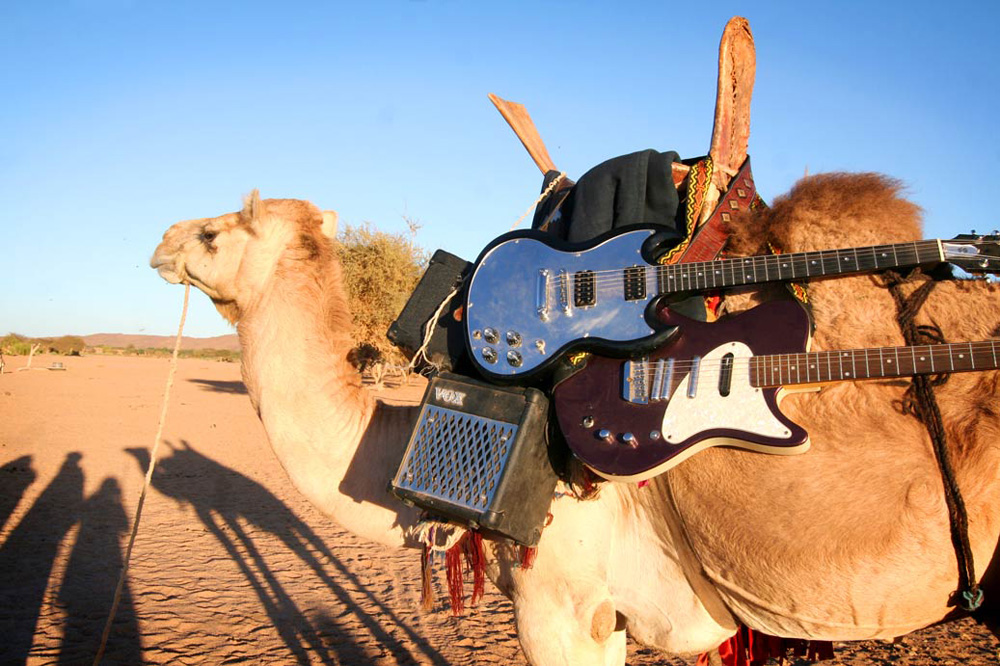
An interview with Tinariwen by Tej S. Haldule
The Sahara’s most revered band, Tinariwen, was at the Jaipur Literature Festival recently to play to a large and fascinated crowd. Rock veterans of the best sort (PopMatters recently called them the ‘greatest band the world, bar none’, sentiments that have been echoed across the globe), Tinariwen are an ensemble collective from the deserts of Africa and have been operational for decades.
Creation 5 spoke to them on the eve of their performance.
1. The history of your origins is very interesting indeed. Could you tell us a little about where you and your music come from?
Our music comes naturally from our traditional culture. Tinariwen’s founders discovered the guitar and brought it to the desert, and we learnt to play by ourselves, with traditional rhythm and tunes serving as our natural inspiration. Also a big motivation was explaining our geo-political situation, as we were in exile over this period.

2. With Tinariwen being a rotating ensemble of troubadours and musicians, do you find it difficult to really define yourself as a band in the traditional sense of the word? Is a band how you classify yourself so it becomes easier for Westerners to relate to your group ?
Tinariwen is the representation of the modern aspect of our culture, and also the speakers for our population, now in all the world. Since the band exists for more than 30 years now, during its story many musicians took part in the team occasionally. But since we began to tour in the West, the set up is almost the same, two experienced members and four from younger generation.
3. You are known for your outspoken political activism, like your recent statements against the coup in Mali – one of your members has even been detained at airports, internationally. Do you think, as popular artists, that you’re obligated to take up issues you believe in?
Tinariwen is always looking for a peaceful solution to their population’s situation. The music and lyrics seem to make people happy to hear of life out in the desert, to discover how much we love our way of life. Of course, like everybody else, we have to be concerned about the evolution of our world’s situation.
4. What can we expect from your upcoming LPs? Would you say Tinariwen as a project is satisfied with it’s sound, or is there room for experimentation on future releases?
For this new album, we recorded in the Californian desert – our own Sahara was not secure enough for our crew. Emmaar means the heat of the breeze, it is a metaphor about the situation in our lands… the tension before the war, the revolution.
We invited some of the musicians we met during our many tours to contribute to the previous album. It is always a pleasure to meet some musicians, with the experience and sensations that arise when they have a meeting with our music, we have some great fun!
5. From herders to exiled rebels to poets, the musicians in your band have fascinatingly slipped through an assortment of roles. Is it not difficult to balance lives of such distinct passions?
When you live a moment from war, you are looking to find peace without arms. That’s why our arms are the music we make. Also the opportunity arises to speak with various media, to find a reasonable way to build a future society. But since it’s surely against world interest in a way, we cannot follow the money making direction of our spirit…… we all have to wake up for humanity, for our children!
6. As your band-leader Ibrahim Ag Alhabib has stated in previous interviews, you are notoriously unaware of the modern music scene. Have you chanced upon any electronic music over the course of your travels? What do you think of these sounds?
Of course we listen to a lot of electronic music. Sometimes we try to imagine and understand what the people like about this style and these sounds – often, it portrays the dark and industrial sensibilities of an urban society. This helps to create an ambience and color the spirit.

7. What do you have in store for the JLF audience? Are you customising your set to Indian sensibilities in any way?
We will prepare a set list to give a new Indian audience a glimpse of all of what we are with our music. As to understanding lyrics, that will take longer. We hope people will be curious enough by the end of the set to look at our albums or website about what we are singing. Our show will go from tradition to modernity, with the ancestral spirit underlying it always.
8. How did you hear TV On The Radio’s music, and what about it appealed to you? Tell us about your collaboration with Tunde Adebimpe and Kyp Malone on your last album.
We met Kyp and Tunde at the Coachella Festival a few years ago, and the idea to invite them to the Sahara desert was born! Their simplicity when living in these circumstances was wonderful, and the whole situation was an amalgam of experiences… they play music with heart and spirit.
9. You have been widely acclaimed over the past decade. Do you ever read what the critics have to say about you, and does it matter?
Of course we are always curious to hear what critics have to say, they help us understand what the audiences feel about our music!

Tinariwen’s sixth studio album, Emmar, releases this February.
Imidiwan Ahi Sigdim from their new album Emmaar:
Follow Tinariwen on:
Facebook
Twitter
Google+
YouTube
and visit their Website



